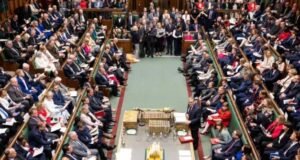
Jeremy Corbyn faces a battle over Labour’s Brexit policy later as members choose between two competing strategies at the party’s annual conference.
They will decide whether Labour should explicitly back Remain in any future referendum, or adopt Mr Corbyn’s stance of staying neutral until a later date.
Unison has broken ranks with other unions to back the Remain motion.
The BBC’s Laura Kuenssberg said this could “shift the balance” and increase the chance of Mr Corbyn being defeated.
With unions controlling half of the votes at the conference, their position is vital.
The majority of Labour’s 12 affiliated unions, including Unite and the GMB, will back the leadership in a series of votes at about 17.20 BST, having agreed a joint position with Mr Corbyn two weeks ago.
But our political editor said Unison’s move – also followed by the Musicians’ Union and the TSSA – was very significant, and makes it more likely that conference decides to back a Remain stance.
Manuel Cortes, the general secretary of the TSSA, said his union will back calls for Labour to support remain in the election.
“We are an independent trade union, we tell the Labour Party what to do, it’s not the other way round,” he said.
Labour’s position on Brexit has dominated the conference agenda, with huge disagreements over the issue.
The party’s draft plan for its Brexit policy, put forward by Mr Corbyn, suggests that, if Labour wins power in a general election, it would remain neutral while negotiating a new deal with the EU within three months.
It would then hold a referendum within six months, and the party would decide which side to back ahead of that at a special conference.
But grassroots activists at the conference have campaigned for an unambiguous Remain stance.
Late on Sunday, attempts to find a consensus during a behind-closed-doors “compositing” meeting failed to agree on words for a single Brexit motion.
As a result, members are currently debating three separate motions, including one tabled by Tooting Labour calling on the party to campaign “energetically” for Remain.
Backing the motion, Simon Hannah warned the leadership not to “kick the can down the road again” by delaying a decision until after a general election.
“We cannot win an election by not taking sides,” he said. “We need to say it now loud and clear we are a remain party.”
Addressing the conference, shadow chancellor John McDonnell urged the party to respect different views in a future referendum as a way of “bringing the country together”.
He said the answer to the Brexit crisis was more democracy, adding that although he would campaign to remain he “profoundly respected those who support a genuine alternative.”
Other senior figures in Labour such as shadow Brexit secretary Sir Keir Starmer and shadow foreign secretary Emily Thornberry also support a full-throated Remain stance.
But the leader of the Unite union, Len McCluskey, said Labour must avoid dividing on Brexit lines and follow the Tories and Lib Dems in “writing off half of the nation”.
By keeping both Remain and Leave voters onside, he said Jeremy Corbyn would be able “to walk through the door of Downing Street” in the coming months.
“Jeremy Corbyn is a thousand times right in trying to speak up for the whole of the country at this time of crisis,” he said. “Please give Jeremy Corbyn the support he needs.”
So why do the unions matter?
Quite simply because the unions control half of the votes on the conference floor.
United, they really cannot be defeated.
And Jeremy Corbyn thought he had them in the bag when a Brexit position – to stay officially neutral during a snap election – was agreed behind closed doors here in Brighton a couple of weeks ago.
But now one union has broken ranks. And size matters.
Unison is one of the big three…alongside the GMB and Unite.
So Unison’s backing of the Remain motion means there is more chance of it passing.
But to do so, the vast majority of grassroots constituency delegates would have to back it too. Most do support a Remain position at the election.
So the leadership are currently trying to convince some of them that they should put loyalty to Jeremy Corbyn ahead of their views on Brexit.
Even if the Remain motion passes, it won’t automatically be the position adopted in the manifesto.
The final decision is taken at what’s called a Clause 5 meeting on which Jeremy Corbyn’s allies and loyal unions are well represented.
But even if the policy is preserved, the optics of big unions (apart from Unison) outvoting the grassroots wouldn’t be ideal – as Jeremy Corbyn initially came to power as a champion of ordinary members.
Shadow Treasury minister Annaliese Dodds said the economic consequences of Brexit were “so severe” that she believed Labour must back remain in another referendum.
“Is it going to be easy?” she told the BBC’s Carolyn Quinn. “No it is not, because people are passionate in both directions.”
But Stephen Kinnock, the MP for Aberavon, told a fringe meeting organised by the Social Market Foundation that Labour had had “more Brexit positions than the Karma Sutra”.
Describing the first two days of conference as an “utter shambles”, he said Labour should have stuck with its 2017 manifesto pledge to honour the referendum result and moving away from this this would not go down well in Leave constituencies.
“Our position on Brexit is being treated with ridicule on the doorsteps in my constituency,” he said.
“We could end up passing three contradictory motions and then it would be up to those writing the manifesto to decide. Good luck with that.”
Away from Brexit, Labour has announced a pledge to introduce free personal care in England for over-65s, so they will not have to pay for help with dressing, washing and meals.
In his speech, Mr McDonnell also pledged to end in-work poverty within five years and to move to a four day, or 32-hour, working week within a decade without any cut to pay.
These are the latest of several new policies likely to feature in the party’s next election manifesto, including pledges to:
Scrap Ofsted, which it called “unfit for purpose”, and replace it with a new schools inspections system
Make NHS prescriptions free in England, bringing it in line with Scotland, Wales and Northern Ireland
Force large employers to provide flexible working hours to women experiencing symptoms of the menopause
 Weekly Bangla Mirror | Bangla Mirror, Bangladeshi news in UK, bangla mirror news
Weekly Bangla Mirror | Bangla Mirror, Bangladeshi news in UK, bangla mirror news







